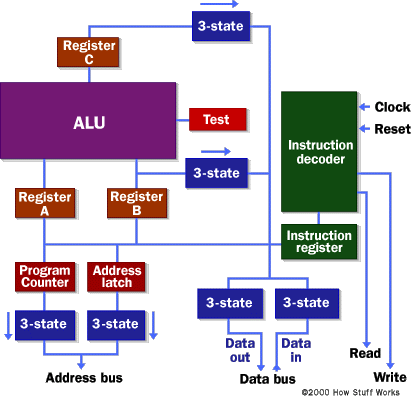
RAM and ROM.
The different types of memory are looked at in some detail and the bios introduced.
This site is the online version of the Howstuffworks media company.
It is well laid out in an easy to read style with hyperlinks to any new
terms used.
It as six sections on the microprocessor plus links to related information
and a search facility.
There is the usual internal navigation at the end of each page, next/
previous page etc. or you can select the section that interests you and
go straight there.
Each section is on a separate page and the six sections are:
Introduction to how microprocessors work.
This gives a brief summery and as links to describe different
types of machine.
Microprocessor history.
Here is the history from Intelís 404 through to the Pentium 4
with explanations of bits, transistors, MIPS etc:
Inside a microprocessor.
To understand how a microprocessor works, we look inside and
learn about the logic used.
This picture from How
Things Work helps in the explanation.

RAM and ROM.
The different types of memory are looked at in some detail and
the bios introduced.
Microprocessor instructions.
Assembler and assembly language is introduced with some of the
instructions explained.
Microprocessor performance.
Here we see that it is more than numbers of transistors that
equate to performance.
Each of the sections gives a good description of its subject without
been too overwhelming. Each uses pictures or links to good effect and any
terms that are not linked are generally explained within the text.
I think that this site could be useful to students of T171 in conjunction
with module 1 section 2.3 the microprocessor as it reinforces the
work already done.
It gives a rounded view of the history and functions of the microprocessor,
the content is well written with useful links to other aspects of the course.
There is a good explanation of Boolean and the diagram on the development
of Intelís chips shows the increase in transistors per chip (Mooreís Law)
very vividly.
My overhaul opinion of the site is that it is a good easy to read source
of information, the links work well and the pictures/diagrams are useful.
| Next | Back | Back to index page |